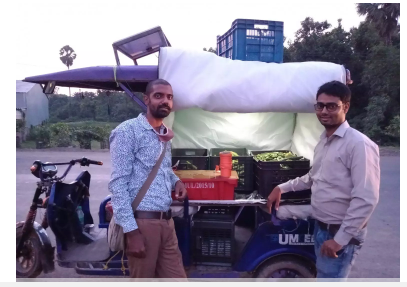Nikki Kumar Jha and his sister Rashmi Jha are the brains behind the Saptkrishi-a start-up revolutionising the way it saves farmer produce from wastage. Sabjikothi is IIT Kanpur incubated start-up co-founded by the Jha sibling. At 25 years old, Nikki holds a master’s in Ecology and Environment Science from Nalanda University. Rashmi is a biotechnologist by qualification. In conversation with The EarthView, Nikki discussed Saptkrishi, Sabjikothi, India’s farmer community struggles, his other start-up and many more things.
Here are excerpts from the interview.
Q: Tell us about the inspiration behind Sabjikothi.
Nikki Kumar Jha: As a person who grew up in the village of Naya Tola Dudhela in Bhagalpur district, Bihar, I have witnessed the abundant farm produce and its equal wastage. Usually, a farmer divides his land for growing staple crops, fruits and vegetables. While 60% of the farmland is dedicated to staples that earn for the larger expense of the household, 40% of the land is sowed with fruits and vegetables for consumption and sale in the daily market. These fruits and vegetables produce runs a farmer’s household daily.
I have always troubled by the wastage of these fruits and vegetables. It is pretty difficult to keep the produce fresh for a longer period after harvesting. Due to the weather, half the produce of the fruits and vegetables loses its appeal by the time it reaches the daily market. During my master’s course, I have done a lot of research concerning this economy and the poverty that it brings. Sabjikothi is an attempt to help farmers individually or largely keep their produce fresh for up to 30 days, giving them ample time to either consume or sell it.
Q: You keep on insisting that Sabjikothi is not cold storage. What is the principle behind the mechanism, and how does it differ?
Nikki Kumar Jha: Like many others, I too tried a cold storage mechanism to save the produce, but it didn’t work out. My sister Rashmi pointed out that we need to think from a fresh perspective altogether. After a lot of research, we finalised the mechanism of creating a microclimate for the produce. It should be high humidity, near sterile, electronically oxidised ethylene in small constituents to stop it from getting rotten. All it needs is a litre of water, a 20-watt electric bulb and an isolated chamber, preferably a tent. It comes with a regulator, which can change the microenvironment within the storage device, depending on the crops stored. We have even made adjustments for mixed micro environments, wherein a farmer can deposit a collection of fresh fruits and vegetables. The shelf life of all the produce will not be the same. It will be specific to fruits and vegetables. This is an IoT-enabled feature as well.
They can store up to 200 kg, 500 kg and 1,000 kg and per unit they cost Rs 10,000, Rs 20,000 and Rs 40,000 respectively. Sabjikothi comes with the novel idea to incorporate storage and transportation solutions into one unit while using ethylene-degradation as the preservation technique.
Q: Since, it’s a simple mechanism of creating a microenvironment to which it accustoms the produce, is this why it’s so affordable?
Nikki Kumar Jha: The whole idea of keeping it simple is to make it affordable and easy to implement, even on trolleys and carts. It has to be easily operational so that our farmers are not worried about it being high tech. If it is expensive, it defeats the purpose of Sabjikothi.
Q: You mentioned you are optimistic by nature. Were you always so confident about your project? How do you feel seeing acceptance and appreciation?
Nikki Kumar Jha: I have to be optimistic and patient. It took me several years to finally come to this model. I had a gut feeling that it would be successful. I have had my share of struggles, but success without failures is devoid of lessons.
Q: Tell us some more facts about your start-up. What are the plans for Sabjikothi?
Nikki Kumar Jha: Sabjikothi is a one of its kind project globally. It is very specific to the Indian agriculture system. A few countries to take this up to have approached us. Country-wise, we are sending the product to the state government to help our farmers.
Q: What is the impact that Sabjikothi is having on the environment?
Nikki Kumar Jha: Apart from the reduction in post-harvest wastage by over 30%, the smallest 200 kg variant of the Sabjikothi can help avoid up to 1,876 kg of CO2 emissions annually. This is equivalent to growing 60 trees. Wastage generates methane, which enters the atmosphere and eventually combines with oxygen to form more CO2. Saving on electricity is another significant impact.
Q: You mentioned that there are other start-ups up your sleeve. Give us some details.
Nikki Kumar Jha: I am simultaneously working on Urinalytics- a start-up that can provide preventive health reports analysing urine. We will install the diagnostic tools in toilets and once someone uses them, they can get the report of body functions. We have created a complete tool in India. The pilot project is soon to be installed at IIT Kanpur.
Q: Today’s youth has a very different perspective on sustainability and environmental issues. What advice would you give to them?
Nikki Kumar Jha: I believe that instead of thinking of changing the universe with big ideas, we should all focus on problems that affect us in our daily life and then try to replicate the solution to the masses to ease poverty and promote sustainability. It just takes a dedicated individual to bring positive change to society. We can all do it.

